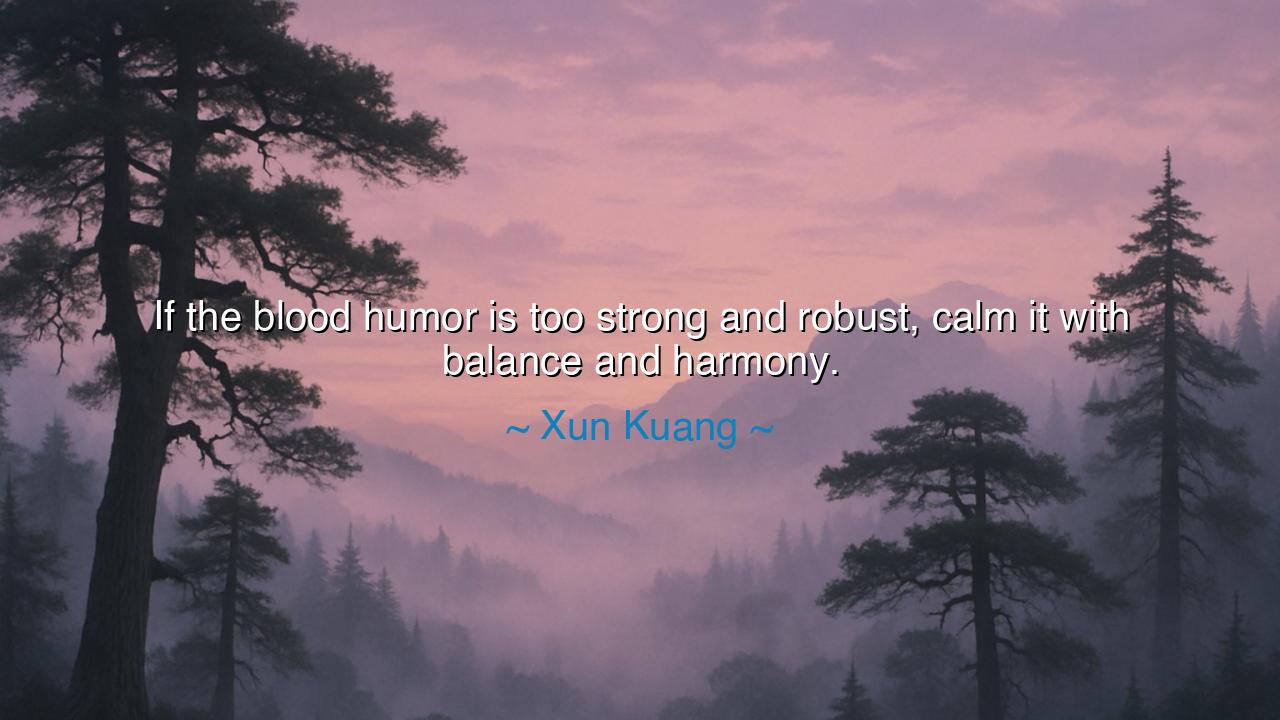
If the blood humor is too strong and robust, calm it with balance






The words of Xun Kuang—also known as Xunzi, the great Confucian philosopher of ancient China—“If the blood humor is too strong and robust, calm it with balance and harmony,” flow with the serenity and insight of a sage who understood the delicate rhythm between nature and the human spirit. Beneath their surface, these words are not merely a reflection on the physical humors of the body, but a profound metaphor for the temperament of the soul. Xunzi, a man who lived in an age of conflict and disorder, spoke often of cultivating the self amid chaos. In this brief teaching, he reveals that true strength is not found in unchecked vigor, but in measured harmony—that the heart, like the body, must be balanced to achieve wisdom and peace.
In ancient Chinese philosophy, and indeed across the ancient world, the concept of humor or internal element was not only biological but moral and spiritual. The “blood humor” symbolized vitality, passion, and power—the fiery force that drives both life and ambition. Yet when this force grows too strong and robust, it ceases to serve harmony and instead becomes destruction. Just as excess heat scorches the harvest, unrestrained passion burns the heart. Thus, Xunzi’s counsel is timeless: temper strength with stillness, passion with principle, energy with restraint. In the mastery of balance lies the art of living.
The origin of this wisdom lies in the Confucian ideal of moderation and self-cultivation. Xunzi, unlike some of his contemporaries, believed that human nature was not inherently good but had to be refined through learning, ritual, and discipline. To him, the “blood humor” represented those natural impulses—desire, anger, pride—that, though powerful, must be educated by reason and ritual if humanity is to live in harmony. His teaching mirrors that of the Greek philosopher Aristotle, who called virtue the “mean between extremes.” Both sages, worlds apart, came to the same truth: virtue is born not from suppression or indulgence, but from balance.
Consider the story of Emperor Ashoka of India, whose life illustrates this teaching perfectly. In his youth, Ashoka’s “blood humor” was fierce and unrestrained—his strength of will turned to conquest and cruelty. He waged terrible wars and brought kingdoms to ruin. But when he beheld the suffering his ambition had caused, he was transformed. He learned to calm his inner fires through compassion and wisdom, embracing the path of peace and justice. In balancing his once-destructive vigor with moral restraint, Ashoka became one of history’s most enlightened rulers. Like Xunzi’s teaching, his life showed that true greatness is not the power to conquer others, but the wisdom to govern oneself.
Xunzi’s wisdom also carries a more personal truth for every soul. The “blood humor” is not only the fire of warriors and kings—it dwells in all of us. It is the surge of anger when we are wronged, the rush of pride when we succeed, the fever of desire when we want too much. These things are not evil in themselves; they are the vital energies of life. But when they rule us rather than serve us, they distort our nature. Thus, Xunzi bids us to “calm” them—not to extinguish, but to refine. The instrument must be tuned, not broken. To live well is to know when to act with passion, and when to rest in peace.
This teaching is also deeply medical in its metaphor. Ancient physicians saw the body as a kingdom of humors that must remain in harmony: blood, bile, phlegm, and wind. When one grew too strong, illness followed. Likewise, the spirit becomes diseased when one emotion dominates the rest. Too much pride breeds blindness, too much fear breeds weakness, too much desire breeds emptiness. The remedy is not punishment, but balance—the cultivation of harmony within. The sage does not fight his emotions as enemies, but governs them as a ruler governs his land: with justice, order, and compassion.
Let this then be the lesson of Xun Kuang’s words: Master yourself through balance. When anger rises, temper it with patience; when desire consumes you, quiet it with contentment; when pride inflates, ground it in humility. For a strong heart without harmony is like a raging river without banks—it destroys the very ground it should nourish. Seek not to extinguish your passions, but to guide them, so that your strength becomes service, your energy becomes light, and your will becomes wisdom.
Thus, as the ancients taught, the path to greatness is not found in excess, but in equilibrium. To “calm the blood humor” is to bring all parts of the self into sacred proportion—to live as the heavens move, steady and balanced, strong yet serene. And when your inner nature stands in harmony, you will find that the world itself seems calmer, for the heart in balance perceives peace in all things. Such is the eternal gift of Xun Kuang’s wisdom: that harmony within creates harmony without, and that through self-mastery, one touches the divine order of the universe itself.






AAdministratorAdministrator
Welcome, honored guests. Please leave a comment, we will respond soon